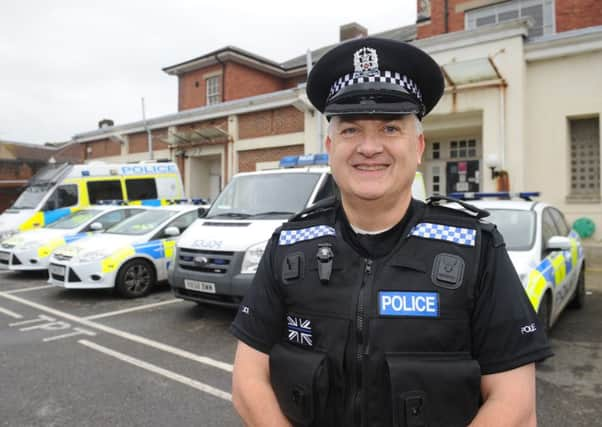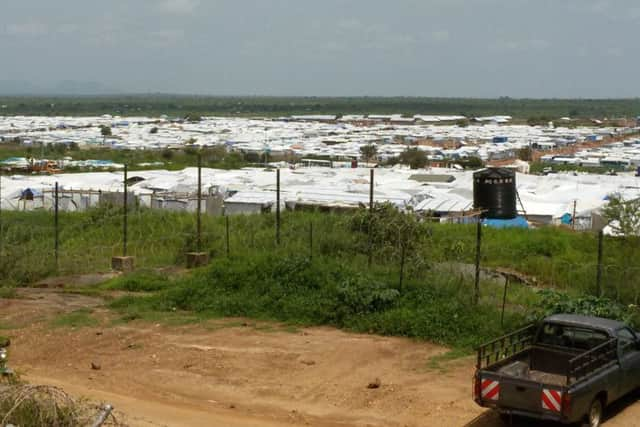Our bobby on the beat in South Sudan


Inspector Kelvin Shipp was tasked with nothing less than setting up neighbourhood policing in the north-east African country.
Deployed to the United Nations’ mission in the world’s youngest country, he was helping train police who were operating within a civil war.
Advertisement
Hide AdAdvertisement
Hide AdAs one of small number of officers deployed abroad from the United Kingdom, the 55-year-old’s role was to help bring the rule of law to the nation.


This was not a jolly abroad – Insp Shipp won an award for his bravery saving a colleague from a mob, had typhoid for a week and lived in a (sometimes flooded) container.
Based in Juba, Insp Shipp – who has served most of his police career in Portsmouth – was involved in supporting South Sudanese National Police Service trainers and introducing community policing to the population.
One of his main tasks was getting three police stations operational in Juba, the capital city.
‘Literally there was the shell of the buildings,’ he says.


Advertisement
Hide AdAdvertisement
Hide Ad‘You had brand new buildings, 200 officers put through training and sensitisation workshops and the commanders identified.
‘The idea was you had Juba which is the capital of Central Equatoria, with these three pilot police stations in Juba which would expand ultimately out of Juba, Central Equatoria, the whole country.
‘We had one station operational as I left, all the plans in place and everything was rolling for the other two.’
But he adds: ‘The big job was actually teaching the community about the concept of community policing.
‘The structure was generally a tribal hierarchy.
Advertisement
Hide AdAdvertisement
Hide Ad‘They didn’t really have that concept around their involvement with policing.
‘They were used to a police force that was very much dictatorial, repressive in some respects and in other ways probably not, but we had to really get the concept that police are there to serve you, not to subject you.
‘But there’s also a “you have a responsibilty to problem-solve in your own community” attitude there.’
All of this was part of the UN’s mission in South Sudan.
The country gained independence and became a republic in 2011 but civil war broke out in December 2013.
Advertisement
Hide AdAdvertisement
Hide AdThe UN High Commissioner for Refugees says that since the outbreak and by mid-2014, there were 1.4m South Sudanese displaced due to the fighting that started in 2013.
And 30,000 refugees – equivalent to a town – were at a camp at UN House in Juba.
Dad-of-three Insp Shipp, of Hampshire police, is one of 100 officers available for international deployment from the Foreign and Commonwealth Office’s stabilisation unit.
He adds: ‘The other aspect was to get the people from the camps to come back into those areas, which is why we wanted those model areas.’
Advertisement
Hide AdAdvertisement
Hide AdHe found desperate people in the camps, given free food and education, were unwilling to leave as the services, including healthcare, were nonexistent. There were just 100 doctors and 29 registered nurses in the country. That meant he worked with non-governmental organisations to arrange care.
‘You get involved in things that you wouldn’t here,’ he says.
With no military background he was given hostile environment training and briefed before arriving in the country via Cairo and Uganda in September 2014.
Living in what was supposed to be temporary transit accommodation for the first few months, he says conditions were ‘appalling’.
Advertisement
Hide AdAdvertisement
Hide Ad‘The power was off a lot of the time, you had problems with the water supply, and you would probably get to sleep at about one o’clock in the morning when it drops down to 28C,’ he says.
When he did get permanent accommodation he was in a container, which flooded twice under torrential rain.
In his deployment he worked with police from 40 nations along with three others from the UK, tackled vigilante groups in the UN camps and tried to head-off gender-based violence in a society where women are valued like cattle.
Experienced Insp Shipp previously deployed in Iraq, suffering incoming rocket fire every day for three months.
Advertisement
Hide AdAdvertisement
Hide AdHe was in Basra in June 2007 to June 2008 working on police leadership training.
He says: ‘When you’re in these positions, that is your world, your life – home is almost a bit distant, a bit detached. It’s difficult to describe. It’s quite a funny feeling, really. It’s very strange.’
In 1981 Insp Shipp started as a special constable serving in Cowplain and Portsmouth for 10 years then joined the force aged 30. At that point he had no idea he would deploy abroad.
‘They’re challenging environments so you learn a lot about yourself and UK policing is so highly-regarded in the world,’ he says. ‘We have policing by consent and that is something people aspire to.’
He adds: ‘I would certainly apply to go again, I enjoy it.’